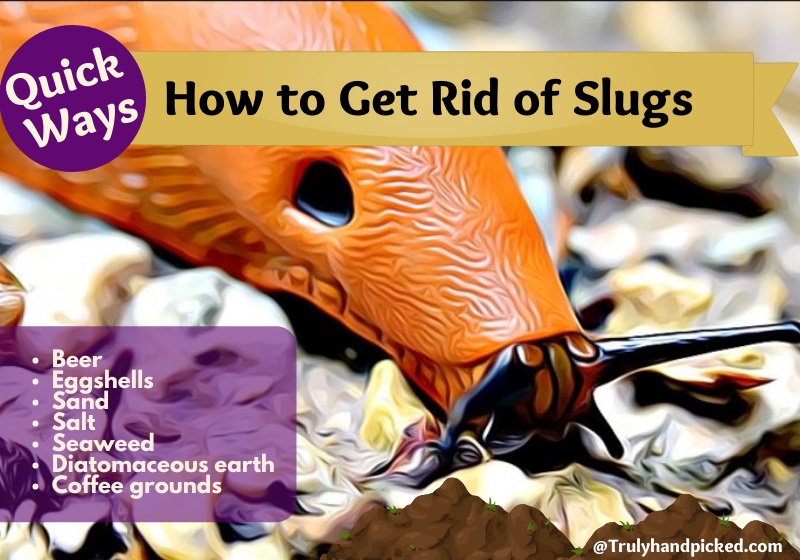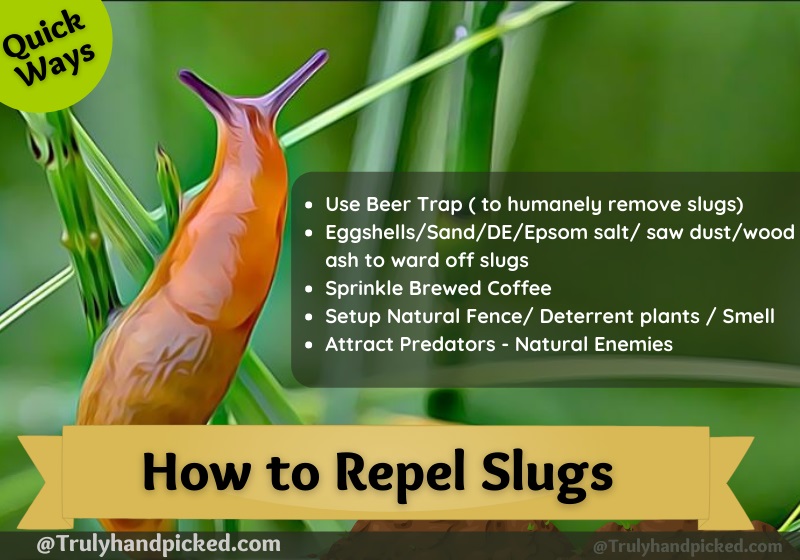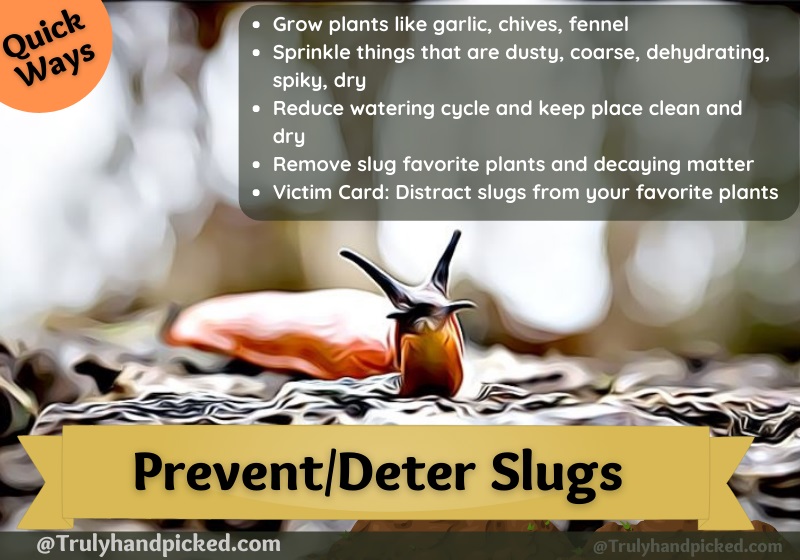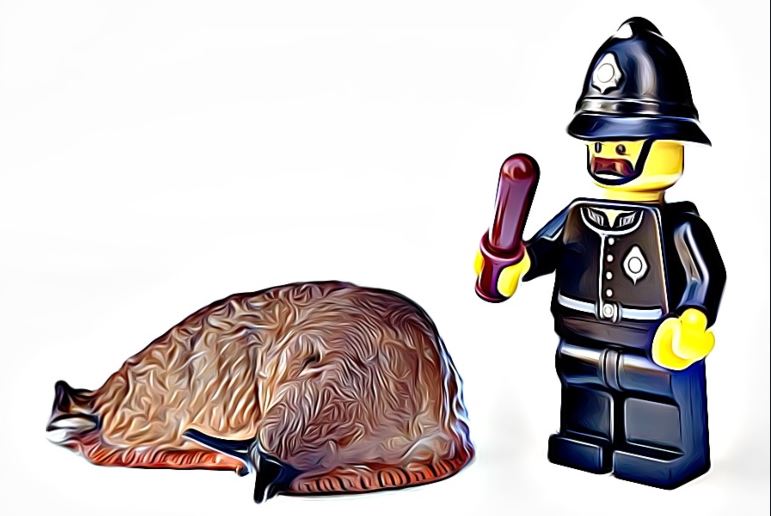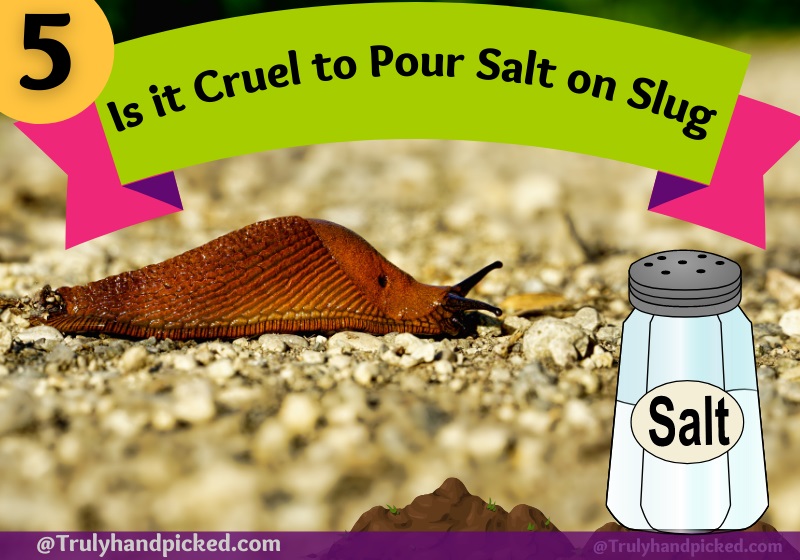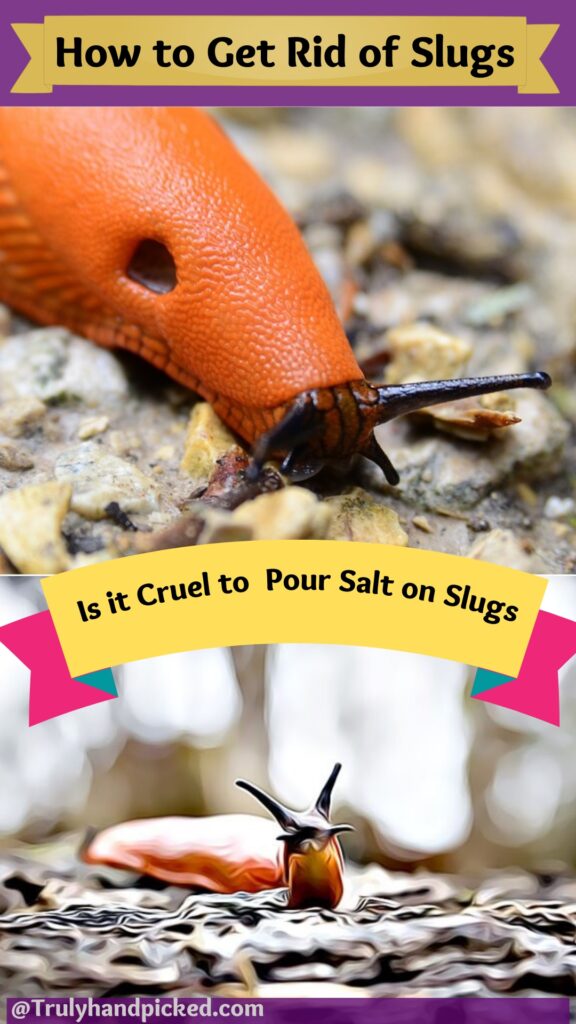Slugs are a nightmare for any gardener. They will eat the leaves, bite on crops, and hamper blooming entirely once they appear in your yard. These tiny gastropods are a real nuisance to our garden plants and must be eliminated as soon as they appear.
While slugs are not poisonous or toxic but, they are unhygienic and damaging pests in your garden. To get rid of slugs distract them with beer or repel them with coffee grounds, salt, eggshells, diatomaceous earth, saw dust, and sand.
Also use plants like chives and garlic to ward them off or attract natural predators. Moreover setup barriers with ash, copper fence and tapes to discourage their presense in your garden.
Getting rid of these stubborn pests is not easy, especially when we don’t want to apply chemical-rich pesticides to our favorite plants.
However, some keen options are on your way with us, just try to apply them accurately and say goodbye to the damaging creature from your garden forever-
Slugs Quick Summary
Where Do Slugs Come From?
Slugs are mostly the evolving form of snails. When they lose all shell parts over time, they transfer into slugs.If you wonder how do they appear in your garden, then it’s quite easy to find.
Slugs like the damp, moist places, and they get through any tiny hole to reach their destination. So, if you offer them such a place near your houseplants, they can crawl to your yard from anywhere and anytime!
Are Slug Harmful and Poisonous?
Slug is simple and quite univalved, which never provides any dangerous effects to humans or pets. The only thing they can harm is that destroying your plants as well as the crops.
They will eat all your fruits and vegetable steadily along with all the labor that you have spent to cultivate them. Sometimes, they carry parasites and transmit them if someone accidentally ingests them or gets in close contact.
Some species of slugs are even edible for humans in cooking dishes. So, we can say that slugs are unhygienic but not poisonous to us in any manner.
What Damage Slug Do to Plants?
Slugs can provide serious damages to your plants. Some of the common harm they do are-
- Eating the tender leaves of your growing plants
- Hampering seedlings
- Taking bites on your unripe and ripe crops
- And damaging your crops badly.
Can Plant Survive Slug?
If slugs harm the growing tips of your garden plants, then, it is hard to recover for your plant, no matter how hard to try. However, if they took a bite on only the outer leaves, then there could be a chance to survive for your plant though.
What are Slugs Attracted to?
Slugs can destroy the entire garden plants if they stay long in your yard. Some of the most common things of a plant, which attract the clan of slugs to your houseplants are-
- Tender leaves
- Succulent stems
- Soft fruits and veggies
- Stems of seedlings
- And juicy crops
- Fermenting and decaying organic matter things
They mostly step into your garden when found a damp or heavy moist spot around the plants and soon recover the cropping plats as the food source.
How to Get Rid of Slugs:
Natural Home Remedies to Prevent Slugs:
Some of the home remedies can save you and your farm from the grasp of slugs efficiently. You need to sprinkle them directly on slugs or set a trap with that option cunningly.
The best part of using these home remedies is that you don’t need to spend much money on them and won’t get any harmful side effects as well. Some of the most effective slug repellent options we can have in this list are-
- Beer
- Eggshells
- Sand
- Salt
- Seaweed
- Diatomaceous earth
- Coffee grounds
How to use a beer trap to deter slugs
Actually, beer doesn’t deter slugs instead it attracts slugs towards it. Snails/slugs are attracted to the smell of yeast in the beer, so adding a cheap beer to an unused small container will lure them. If the container is deep enough they will go on sipping and get drowned in the same.
It’s humane to attract them and throw away or to distract them from your favorite plants. It’s like you are inviting the slugs for a beer party and gently getting rid of them.
Use eggshells as a prickly barrier for snails
Roughly crushed eggshells will act like broken glass pieces for the slugs. Since slugs are soft-bodied and depend on the mucus to crawl, it’s hard for them to cross the borders made with eggshells.
Simple sprinkle washed and crushed eggshells around the plants which you want to safeguard from these gastropod molluscs.
How Sand/ Diatomaceous Earth/ Epsom Salts Deter Slugs?
Slugs generally avoid anything that is dusty, coarse, dehydrating, spiky, dry as it’s going to scratch its soft body. So you can use coarse sand, DE or even Epsom salts and tell the slug in its language that “you are not invited here in my garden”.
Coffee grounds to Repel Slugs
You can sprinkle the home-brewed waste coffee grounds or can get it from a nearby expresso shop (even they are happy to give it to you).
Dusting or spraying brewed cooled coffee solution around your flower beds and garden beds making your soil caffeinated is a proven and effective way to deter snails and slugs.
While coffee is not toxic for us and plants, it’s toxic for slugs (in a small dose it scares them off while a heavy dose even kills the slugs).
Apart from slugs coffee grounds also repel cats and a few more pests from your garden beds, while it’s entirely safe and biodegradable.
Also, you can check for smells that cats hate to repel them off from your yard.
Try Natural Repellents Like Deterrent Plants and Smell:
Plant some slug-repellent herbs and plants in your garden as the companion plant around the cropping tree. Slugs usually hate to stay around those greeneries, which have a strong scent.
This trick will deter them easily from your yard without spending money or time! Some of the most useful plants in this regard are as follows-
- Chives
- Garlic
- Fennel
- Foxgloves
- Geranium
- And any herb from mint species
Encourage /Attract Natural Slug Predators to Your Garden:
Bringing some strong slug-predators can aid you immensely in this attempt. They will feed those slimy disturbing creatures from your yard and save the crops from destroying naturally.
Similarly, you can attract ladybugs to get rid of aphids on your plants.
But make sure you don’t pick on another destroyer in the way of eliminating slugs in this step. So, get only those predators, which have an interest in gastropod and mollusks, or always keep a close look at your plants, once you bring those predators in. Some of the best slug-predators are-
- Ducks
- Hedgehog
- Marsh flies
- Centipedes
- Lizards
- Songbirds
- Snakes
- Opossums
- Ground beetles
- Toads
- Nematodes, etc.
How to attract birds to your garden to get rid of pests that damage your plants.
Create/ Setup Slug Barrier:
Putting slug barrier around your plants, particularly the cropping ones, can save your garden from destroying gastropod slugs. You can try this option around the whole garden bed or individually around each plant, depending on your need. Make sure you pick the right option for fencing to get the expected result. Some of the most effective options are-
- Copper fence
- Copper tape
- Wood ash barrier
- Steel wool
- And wood pellet
Distract Slugs from Your Garden Beds:
Distracting slugs can be a smart move indeed that can keep away from your favorite cropping plants and their succulent stems. But you must remember that they will soon get back to their food sources once they get removed from their diversion. So, smart gardeners always eliminate the source, once slugs get into that distraction. Some useful tips here are-
- Situating a damp moist place far from your cropping plants,
- Setting a pond with succulent aquatic plants along with predators
- Putting a damp newspaper trap near your juicy plants
- And setting slug traps with sticky holders that can confine slugs inside the trap unless you remove them.
Prevent Slugs from Coming to Your Garden
Some other cunning tricks to keep slugs at bay in your garden are-
- Remove slug’s favorites from your yard
- Eliminate plants that allure slugs more
- Water your plants less, and only when they turn dry
- Keep the ground clean and dry
- Never allow any damp or moist place ear your garden area
- Place bright light around the cropping plants as dark and damp spots inspire slugs more
- And keep an eye on your plants, so then, you can notice the very first appearance of slug in your place and control it in time.
FAQ on Garden Slugs:
Is it Cruel to Pour Salt on Slugs?
Yes, of course, it is cruel to pour salt on slugs as it will make them die slowly by triggering osmosis.
What Do Slugs Eat?
Slugs are herbivorous, omnivorous, carnivorous, and detritivores. Thus, they can eat plenty of things like plants, crops, leaves, decaying waste, animal waste, fungus, worms, and even other snails as well.
How Long do Slugs Live?
Slugs can live up to 18 months to 2 years, depending on their exact species and food sources.
What is the Life Cycle of Slugs?
They go through four life stages in their life cycles following eggs, neonate, juvenile slugs, and adult slugs.
Save to Pinterest
